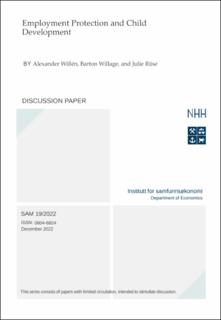| dc.contributor.author | Willén, Alexander | |
| dc.contributor.author | Willage, Barton | |
| dc.contributor.author | Riise, Julie | |
| dc.date.accessioned | 2022-12-06T12:57:10Z | |
| dc.date.available | 2022-12-06T12:57:10Z | |
| dc.date.issued | 2022-12 | |
| dc.identifier.issn | 0804-6824 | |
| dc.identifier.uri | https://hdl.handle.net/11250/3036143 | |
| dc.description.abstract | This paper exploits conditional random assignment of patients to general practitioners to calculate a leniency measure of paid sick leave certification. We link these data to information on the human capital development of the patients’ children. We find sizable negative effects of parental sick leave enrollment on the child’s human capital development. In addition, we show that the timing of parental enrollment in these programs matter. In terms of mechanisms, we find that sick leave makes parents more likely to exit the workforce, earn lower wages, and become increasingly dependent on the social safety net. The results highlight that the trade-off between social protection and work incentives extends well beyond the individual worker, and emphasizes another dimension of the home environment through which children’s human capital is shaped. In addition, it implies that the costs of traditional employment protection programs are larger than previously thought. | en_US |
| dc.language.iso | eng | en_US |
| dc.relation.ispartofseries | SAM DP;19/2022 | |
| dc.subject | Human Capital Development, Skill Formation, Employment Protection, Intergenerational Links, Welfare Dependence, Sick Leave | en_US |
| dc.title | Employment Protection and Child Development | en_US |
| dc.type | Working paper | en_US |
| dc.source.pagenumber | 52 | en_US |
| dc.relation.project | Norges Forskningsråd: 262675 | en_US |
